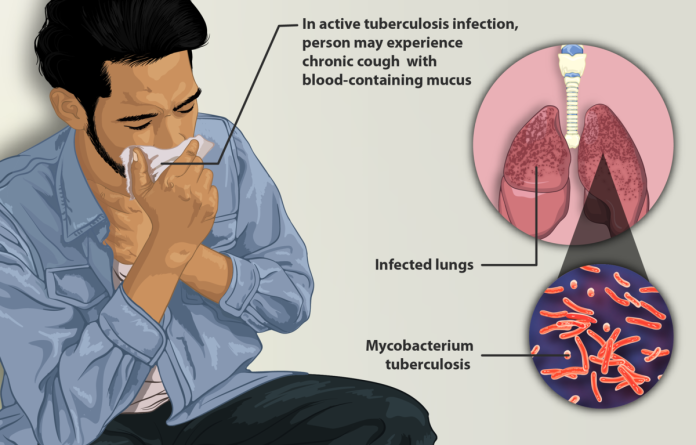The Federal Government on Tuesday restated its commitment to ending TB as a public health problem by 2030, and achieving global TB targets by 2035.
The government made the reaffirmation at the 2024 National TB conference themed, “Public-Private Partnership and integrated service delivery – Panacea to end TB in Nigeria,” in Abuja.
The World Health Organization targets to end the global TB epidemic by 2035, which include reducing TB deaths by 95 per cent, TB incidence by 90 person cent, and eliminating catastrophic costs for TB-affected households compared to 2015 levels.
 In her special remarks, the First Lady, and the Global and National Stop TB Champion, Senator Oluremi Tinubu, said she is committed to the collective fight against TB, public and private partnership, and the integrated delivery of services that leaves no one behind.
In her special remarks, the First Lady, and the Global and National Stop TB Champion, Senator Oluremi Tinubu, said she is committed to the collective fight against TB, public and private partnership, and the integrated delivery of services that leaves no one behind.
Tinubu noted that despite the progress made in the fight against TB, the global burden of TB still remains alarming, particularly in low and middle-income countries like Nigeria.
She said, “Globally, and according to the 2024 World Tuberculosis Report by the World Health Organisation, an estimated 10.8 million people developed TB in 2023, with 1.6 million people losing their lives, and 12 per cent of the global burden affecting the most vulnerable – the children and young adolescents.
 “Tuberculosis is still a leading cause of death in Nigeria. The country ranks as the sixth highest burden country across the world and first in Africa. The WHO Global Tuberculosis Report 2024 also reveals that Nigeria recorded approximately 467,000 TB cases in 2023. Despite these challenges, I am encouraged by the progress that has been made so far. Thanks to the commitment of the Tinubu administration, civil society organisations, healthcare providers, and international partners. Subsequently, we have seen a steady increase in the number of people diagnosed and treated for TB.
“Tuberculosis is still a leading cause of death in Nigeria. The country ranks as the sixth highest burden country across the world and first in Africa. The WHO Global Tuberculosis Report 2024 also reveals that Nigeria recorded approximately 467,000 TB cases in 2023. Despite these challenges, I am encouraged by the progress that has been made so far. Thanks to the commitment of the Tinubu administration, civil society organisations, healthcare providers, and international partners. Subsequently, we have seen a steady increase in the number of people diagnosed and treated for TB.
“However, as we celebrate our successes, we must also acknowledge that there is still much work to be done. We cannot afford to be complacent, and I assure you that the Federal Government, remains fully committed to achieving the global TB targets by 2035.”

To achieve this, she said there is a need for sustained investment, innovative strategies, and a renewed focus on breaking the barriers that prevent people from accessing the care and support that they desperately need.
“As the Global and National Stop TB Champion, I am committed to our collective fight against TB. I believe that the solution to ending TB lies in the strength of our partnerships both public and private, and in the integrated delivery of services that leave no one behind.
“I am glad that the money I donated earlier this year has been used judiciously to procure more TB diagnostics tools which will help to increase TB diagnosis and case finding.
“This conference provides us with the platform not only to share experiences and knowledge but also to recommit ourselves to the common goal of ending TB,” she stated.
In his keynote address, the Coordinating Minister of Health and Social Welfare, Prof Muhammad Pate noted that the leadership of President Bola Tinubu is leveraging health as a tool for healing, unity, and national prosperity.
“As the Coordinating Minister of Health and Social Welfare, along with my colleague, the Honorable Minister of State, I reaffirm our commitment to eliminating TB in Nigeria. Tuberculosis affects millions in our country, especially vulnerable populations, including women, mothers, and grandmothers. Tackling this disease requires an inclusive, rights-based, and gender-responsive approach that leaves no one behind.
“I am proud to report that we have adopted global best practices to accelerate our progress. While Nigeria has made significant strides, we must do more. One of our key strategies was the launch of the Private Sector TB Initiative in July 2024, in collaboration with the Stop TB Partnership Nigeria. This initiative, led by Dr. Bawa and supported by other partners, has mobilised resources to strengthen TB prevention, diagnosis, and treatment efforts.
“Through this initiative, the Nigerian private sector has committed up to $25 million over time to support TB-related activities. Private sector engagement is critical, as these organisations employ large numbers of workers in industries such as banking, oil and gas, cement production, and telecommunications. By integrating TB control into workplace health programs and expanding health insurance coverage, the private sector is playing a pivotal role in our fight against TB,” he stated.
He said the government is fostering an enabling environment through increased domestic funding and accountability mechanisms at all levels, as state governments, in line with the Sector-Wide Approach, and the Compact signed a year ago, are critical to complementing federal efforts.
The minister, however, urged states to prioritise TB within their health budgets and collaborate with the Federal Government to achieve the shared goals.
He said the government is engaging in meaningful dialogues on TB financing and exploring lessons from countries such as the Philippines, Indonesia, and South Africa, and the exchange of ideas will strengthen the collective resolve and strategies for TB elimination.
He called on all stakeholders to unite in the fight against TB, and ensure that every Nigerian has access to prevention, diagnosis, and treatment.
The Acting Board Chair, Stop TB Partnership Nigeria, Dr Queen Ogbuji-Ladipo said the conference underscores the critical role of collaboration and synergy in advancing TB control efforts.
Dr Ogbuji-Ladipo highlighted that Nigeria has intensified efforts to improve TB detection, treatment, and prevention, several challenges persist.
“These include a significant funding gap, low public awareness about TB, stigma, and discrimination against individuals with TB, limited access to healthcare services, and weak collaboration between the public and private sectors in TB control.
“This conference will serve as a platform to share innovative ideas, exchange knows, and discuss effective strategies for addressing the barriers to TB care, particularly among marginalised, and vulnerable populations.
“It will also emphasise the need for comprehensive, integrated service delivery models that ensure equitable access to TB prevention, diagnosis, and treatment, this contributing to the global goal of ending TB,” she added.
The Executive Director of Stop TB Partnership Global, Geneva, Dr Lucica Ditiu expressed confidence that with collective support, Nigeria will lead the way in ending TB, not just for its people but for Africa and the world.
“What is needed is an increase in the financing, this is how to see an end of TB in Nigeria, an other countries. That will not be an overnight thing, but I am sure that with the voice of the First Lady, the Minister, the rest of the government, the private sector, as well as other financial partners, we will be able to arrive there.
“And that’s why that is not just a function of one, it’s a function of all of us coming together to support Nigeria to end TB,” she added.


